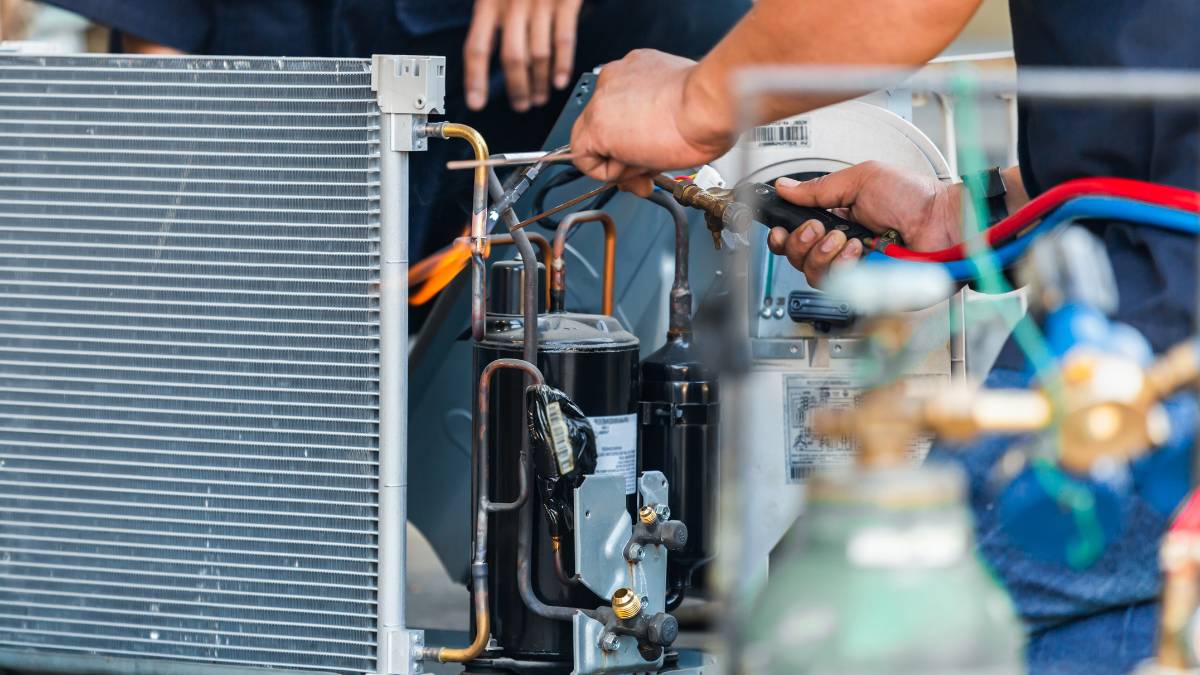Last Updated on June 13, 2024 by Kravelv
Is there anything worse than a malfunctioning air conditioner on a scorching summer day? You’re sweating buckets, feeling like you’re melting into the furniture, and all you want is some cool relief. That’s when you realize your AC is on the fritz. Cue the frustration!
But fear not, fellow heat-sufferers! In this guide, we’ll delve into the nitty-gritty of scheduling air conditioning repairs Melbourne.
Why Timing Matters
Let’s kick things off with why timing is crucial when it comes to AC repairs. Picture this: it’s the middle of July, temperatures are soaring, and everyone in the neighborhood is cranking up their AC. Suddenly, yours decides to call it quits. Now you’re not just battling the heat, but also competing with everyone else for the attention of HVAC technicians.
That’s where scheduling smartly comes into play. By booking your AC repairs during off-peak times, like early spring or late fall, you’ll avoid the rush and likely snag a quicker appointment. Plus, technicians may be more readily available, allowing them to give your unit the attention it deserves without feeling rushed.
Signs Your AC Needs TLC
Alright, let’s talk about the telltale signs that your AC is crying out for some TLC. Ignoring these warning signals is like playing a game of chicken with a heatwave—eventually, you’re going to lose. Here are a few red flags to watch out for:
- Weak airflow: If your vents are barely blowing out a whisper of air, it’s time to investigate.
- Strange sounds: Clanking, banging, or hissing noises coming from your AC are never a good sign. Think of it as your unit’s way of saying, “Help! I’m in distress!”
- AC smells: Funky odors emanating from your vents could indicate mold, mildew, or worse—something’s definitely amiss.
- Inconsistent cooling: One minute you’re shivering, the next you’re sweating—your AC should provide consistent comfort, not a rollercoaster ride of temperatures.
The DIY Dilemma
Now, before you pick up that wrench or start Googling DIY AC repair tutorials, pause for a moment. While it’s tempting to roll up your sleeves and tackle the problem yourself, HVAC systems are complex beasts. One wrong move could turn a minor issue into a major headache—or worse, void your warranty.
That said, there are a few simple tasks you can handle to keep your AC running smoothly between professional tune-ups:
Change your air filters regularly: Clogged filters restrict airflow, making your AC work harder than necessary. Aim to swap them out every 1-3 months.
Keep your outdoor unit clean: Debris like leaves, dirt, and grass clippings can gunk up your system. Give it a gentle hose down every now and then to keep it spick and span.
Invest in a smart thermostat: Not only will it help you stay comfortable, but it can also alert you to potential issues before they escalate.
Finding the Right Technician
When it’s time to call in the cavalry, finding the right technician can feel like searching for a needle in a haystack. But fear not, we’ve got some tips to help you navigate the sea of HVAC professionals:
- Ask for recommendations: Tap into your network of friends, family, and neighbors for trusted referrals. Personal experiences speak volumes.
- Do your homework: Don’t just settle for the first technician you stumble upon. Take the time to research their credentials, read reviews, and compare quotes.
- Look for certifications: A reputable technician should be licensed, insured, and certified by organizations like NATE (North American Technician Excellence).
The Importance of Regular Maintenance
Ah, maintenance—the unsung hero of HVAC care. While it may not be the most exciting topic, regular maintenance is like a magic elixir for your air conditioner, keeping it humming along happily for years to come. Here’s why it’s so crucial:
Prevention is better than cure: Think of maintenance as preventative medicine for your AC. By scheduling regular tune-ups, you can catch potential issues before they spiral out of control, saving you time, money, and a whole lot of sweat.
Boost efficiency: A well-maintained AC is an efficient AC. By cleaning coils, checking refrigerant levels, and tightening loose bolts, technicians can ensure that your unit is operating at peak performance, which translates to lower energy bills for you.
Extend lifespan: Like any machine, your AC has a finite lifespan. But with proper care and attention, you can help prolong its longevity. Think of it as giving your loyal cooling companion a well-deserved spa day—it’ll thank you by sticking around for years to come.
So, don’t overlook the importance of regular maintenance. Schedule those tune-ups like clockwork, and your AC will repay you with years of reliable service, keeping you cool and comfortable through many summers to come.
Bottom Line
At the end of the day, scheduling AC repairs boils down to one thing: taking care of the little things before they snowball into big problems. Whether it’s scheduling maintenance during off-peak times, heeding the warning signs of a struggling unit, or knowing when to call in the pros, a little foresight goes a long way in keeping your cool when the heat is on.
So, the next time your AC starts acting up, don’t sweat it—just remember to sweat the small stuff and schedule those repairs like a pro. Your future self will thank you when you’re basking in the bliss of a cool, comfortable home, even on the hottest of days.

